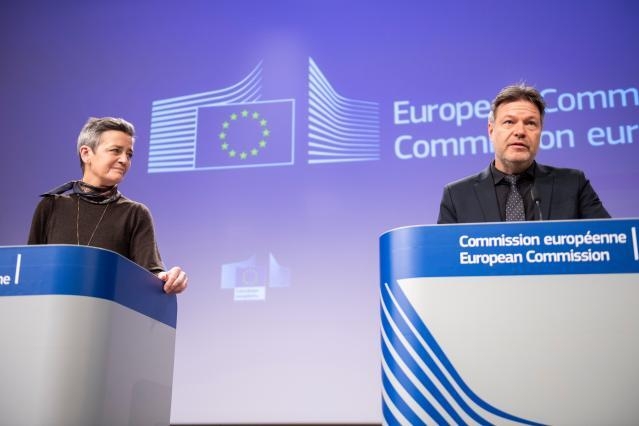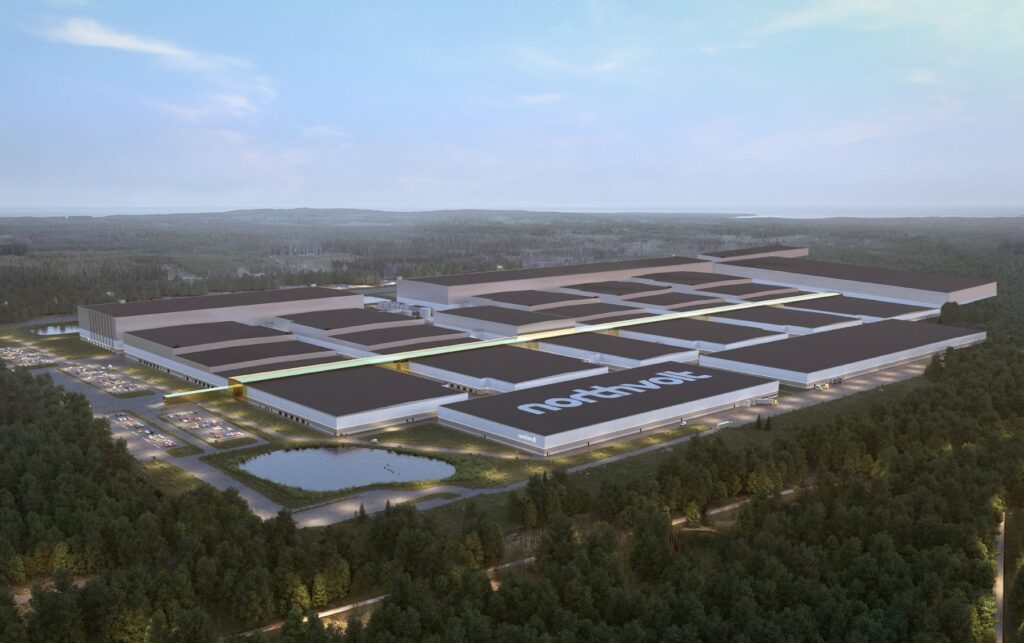The European Commission approved last week €902 million in German state aid to Swedish company Northvolt for building a Gigafactory for the production of battery cells for electric vehicles in Heide, Schleswig-Holstein, instead of the United States. Total investments costs amount to about €2.5 billion.
It was the first individual measure that was approved in line with the exceptional possibility under the new Temporary Crisis and Transition Framework, according to Vice-President Margrethe Vestager, in charge of competition policy. It allows for providing higher amounts of aid if an investment is at risk of being diverted from Europe due to the availability of foreign subsidies.
A Commission spokesperson told The Brussels Times that, without the state aid, Northvolt would have established the plant in the United States, where support was offered in particular under the Inflation Reduction Act (IRA). The amount of aid in the United States would have been higher than in Germany, according to the spokesperson, something which was confirmed by Northvolt.
“As regards the choice of country, it’s correct that the American IRA can generate a higher subsidy but the EU and Germany offer other advantages, for example production of fossil free energy and proximity to our German partners with also have a big production in the country,” a spokesperson of Northvolt said.
The decision was surprisingly announced by Vestager in a joint press conference with German Economy Minister Robert Habeck - the first Commission press conference after the holiday period. Habeck who also serves as Vice Chancellor of Germany hailed the decision as major announcement for both Europe and Germany.
Schleswig-Holstein also happens to be his home state where he started his political career. The region is economically relatively weak and lacks the raw materials necessary for battery production but is known for renewable energy, such as wind energy.
“The production of net-zero equipment in Europe is of strategic interest for the European economy and society. It has immense importance for achieving our goals in clean mobility, sustainability, and competitiveness,” said Vestager.

Vestager (to the left) and Habeck at the Commission's press conference on 8 January, credit: EU
Several Gigafactories needed in Europe
As previously reported, the EU has been pushing for developing an entire value-chain for the production of batteries in Europe by launching the European Battery Alliance, a network of innovation and industry actors established in 2017 at the initiative of Commission Vice-President Maros Sefcovic.
The Commission estimated that to cover the EU demand alone, the battery market requires 20 - 25 Gigafactories to be established in Europe. Northvolt was the first company to build a Gigafactory in Skellefteå, Sweden. In 2020, it planned to target a 25 percent market share in Europe by 2030 with 50 percent of raw material secured from recycled batteries and using 100 % renewable energy.
On Tuesday, the Swedish company announced that it had secured $5 billion in debt financing to help it expand its first Gigafactory and build a recycling facility on the same site. Some of the money will also be used to repay previous loans. It is the largest green loan raised in Europe so far. Northvolt plans to scale up its current capacity of 16 GWh to 60 GWh.
Batteries are crucial for the transition to a green economy in the transport sector and the use of e-vehicles instead of vehicles driven by fossil fuels. What about the raw materials such as lithium and other materials necessary for the production of batteries?
The Commission could not provide information about Northvolt’s options and choices in the new Gigafactory in Germany. The spokesperson of Northvolt told The Brussels Times that the company had not yet finalized its raw materials strategy for the factory and that it can take years to do it. The goal, however, is that 50 % of the raw material will come from recycled batteries.
Recycled battery materials have a carbon footprint that is 70 per cent lower than mined minerals, according to the company. The planned recycling rate of 50 % is much higher than the current average of just 10 % of material demand, according to an audit report last year by the European Court of Auditors (ECA).
High reliance on imported raw materials
EU’s demand for lithium used in electric-vehicles batteries and energy storage is expected to increase twelve-fold by 2030. The Commission referred to the Critical Raw Materials Act, which has been adopted in response to dependencies on several critical raw materials. The Act is expected to ensure the EU's access to a “secure, diversified, affordable and sustainable supply of critical raw materials”.
Vice-President Sefcovic, in charge of the European Green Deal, described the Act last December as the first of its kind in the world for prospecting critical raw materials in the most sustainable way in Europe and the rest of the world. The EU has already signed MoUs with other countries and plan to develop projects jointly with them. We have to work very hard in the race for critical raw materials, he said.
In the audit report, the auditors recommended among others the European Commission to update the strategic action plan on batteries, with a particular focus on securing access to raw materials. Currently, EU’s dependence on raw materials from third countries is very high.
According to data presented in the Commission’s 2023 study on critical raw materials, the EU relies heavily on international markets to secure the primary raw materials used for batteries. The import reliance on five such materials (cobalt, nickel, lithium, manganese and natural graphite) averaged 78 %. For refined materials, reliance is generally lower but still high at 61 %.
EU countries with raw materials are Portugal, France, Finland, and Greece but the lead times of mining projects from discovery to first production are on average between 12 and 16 years. Variations in permit granting procedures which are in some cases delegated to regional or even local authorities can also add to this.
In fact, the EU faces a dilemma should the EU battery production capacity fail to grow as projected. In a worst-scenario the EU could either be forced to delay its ban on vehicles with combustion engines beyond 2035, thus failing to meet its carbon-neutrality objectives, or could be forced to rely heavily on non-EU batteries and electric vehicles.
“Too dependent on geopolitical and economic factors it cannot control, the ‘made in Europe’ battery risks going flat,” Belgian ECA member Annemie Turtelboom, who was responsible for the audit, commented on the latest development.
“The problem is that the EU, at least so far, is not fighting on equal terms or with the same weapons. Access to raw materials is a major roadblock, along with rising costs and fierce global competition, especially with the US and China. The EU faces an uphill battle to turn things around in the space of just a few years, with the 2035 zero-emissions target coming into view.”
Update: The European Commission announced on Tuesday that it is backing (loan guarantees) investments made by its financial partners under the InvestEU programme worth around €392 million to Northvolt, EU’s “battery pioneer”, for the expansion of its Gigafactory in Sweden.
M. Apelblat
The Brussels Times

